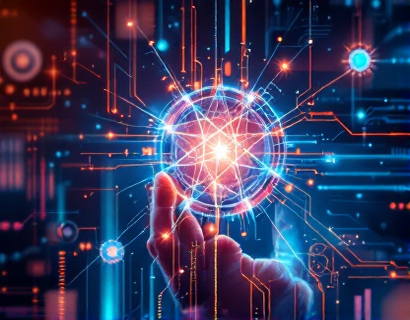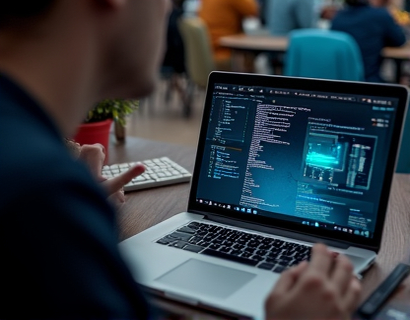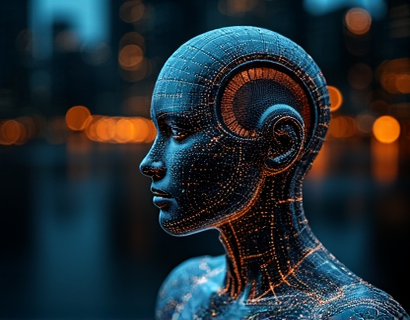Revolutionizing Digital Engagement: The Synergy of Crypto and AI
The intersection of cryptocurrency and artificial intelligence (AI) is ushering in a new era of digital engagement, transforming the way we interact with technology and each other. This fusion of technologies is not just a novel concept but a powerful force driving innovation, efficiency, and connectivity in the modern tech ecosystem. As we delve into this transformative landscape, it's essential to understand how these two domains are converging to create advanced solutions that redefine user experiences and the future of digital interactions.
The Emergence of Crypto and AI
Cryptocurrency, since its inception with Bitcoin in 2009, has evolved from a niche digital currency to a robust ecosystem encompassing various assets, smart contracts, and decentralized applications (dApps). Meanwhile, AI has progressed from theoretical concepts to practical applications across industries, from healthcare to finance. The convergence of these technologies is natural, given their shared foundation in complex algorithms and data processing.
The integration of AI into the crypto space has led to the development of smart, adaptive, and secure systems. AI algorithms can analyze vast amounts of data to predict market trends, optimize trading strategies, and enhance security measures. Conversely, the decentralized and transparent nature of blockchain technology provides an ideal environment for AI to operate without the risks associated with centralized data storage.
Enhancing User Interactions
One of the most significant impacts of combining crypto and AI is the enhancement of user interactions. Traditional digital platforms often struggle with personalization, leading to a one-size-fits-all approach that fails to meet individual user needs. AI-driven solutions can analyze user behavior, preferences, and patterns to deliver tailored experiences. In the context of crypto, this means creating more intuitive and user-friendly interfaces for trading, investing, and managing digital assets.
For instance, AI-powered chatbots can provide real-time support and guidance to users navigating complex crypto markets. These chatbots can offer personalized advice, explain technical concepts, and assist with transactions, making the crypto experience more accessible and less intimidating. Additionally, AI can enhance the security of user interactions by detecting and mitigating fraudulent activities through anomaly detection and behavioral analysis.
Decentralized AI Solutions
The true potential of crypto and AI is realized through decentralized AI solutions. Decentralized AI platforms leverage blockchain technology to create transparent, secure, and trustless environments for AI model training and deployment. This approach addresses several key issues in traditional AI systems, such as data privacy, model bias, and centralization of power.
In a decentralized AI ecosystem, data is stored on a blockchain, ensuring that it remains tamper-proof and accessible only to authorized parties. AI models can be trained using data from multiple sources, reducing the risk of bias and increasing the robustness of the models. Once trained, these models can be deployed on the blockchain, allowing for transparent and verifiable AI decision-making processes. This not only enhances trust but also opens up new possibilities for collaborative AI development.
Tokenization and AI-Driven Markets
Tokenization, a core feature of blockchain technology, is being leveraged to create AI-driven markets. Tokens can represent various assets, including data, computing power, and even AI models themselves. This tokenization enables the creation of decentralized marketplaces where users can buy, sell, and trade AI-related assets seamlessly.
AI-driven marketplaces can optimize the allocation of resources by using smart contracts to automate transactions and ensure fair distribution. For example, a platform could use AI to evaluate the quality and utility of AI models, assigning tokens based on their performance and demand. This creates a dynamic and efficient market where the best AI solutions rise to the top, benefiting both developers and users.
Enhancing Security with AI
Security is a paramount concern in the crypto space, and AI plays a crucial role in fortifying defenses against cyber threats. AI algorithms can monitor network activity in real-time, identifying and responding to suspicious behavior with unprecedented speed and accuracy. Machine learning models can be trained to recognize patterns indicative of attacks, such as DDoS attacks or phishing attempts, and take proactive measures to mitigate these threats.
Furthermore, AI can enhance the security of blockchain itself by improving consensus mechanisms and enhancing the robustness of cryptographic algorithms. For instance, AI can optimize the energy consumption of proof-of-work systems or develop more secure consensus algorithms that are less vulnerable to attacks. This synergy between crypto and AI not only protects user assets but also fosters greater adoption and trust in blockchain technologies.
Innovative Use Cases
The combination of crypto and AI is giving rise to a plethora of innovative use cases that are redefining various industries. In finance, decentralized finance (DeFi) platforms are using AI to create more efficient and accessible financial services. AI-driven lending and borrowing platforms can assess creditworthiness in real-time, reducing the need for traditional credit checks and expanding financial inclusion.
In the healthcare sector, AI-powered diagnostic tools can analyze medical data stored on the blockchain to provide accurate and secure health assessments. This not only enhances patient care but also ensures compliance with data privacy regulations. Additionally, AI can optimize supply chain management in the healthcare industry by predicting demand and ensuring the timely delivery of essential medicines.
In the realm of entertainment, AI-driven content creation and recommendation systems can enhance user engagement on crypto-based platforms. For example, AI can generate personalized content for users based on their preferences, while blockchain ensures that creators are fairly compensated for their work. This creates a win-win situation where users enjoy tailored content and creators receive fair rewards.
Challenges and Considerations
While the integration of crypto and AI offers numerous benefits, it also presents several challenges that need to be addressed. One of the primary concerns is the regulatory landscape. The decentralized and borderless nature of crypto assets, combined with the complex and evolving nature of AI, poses significant regulatory challenges. Governments and regulatory bodies must strike a balance between fostering innovation and ensuring consumer protection.
Another challenge is the technical complexity involved in developing and deploying AI solutions on the blockchain. Ensuring interoperability between different blockchain platforms and AI systems requires robust standards and protocols. Additionally, the computational resources required for AI training and inference can be substantial, necessitating efficient and sustainable solutions.
Privacy is another critical issue. While blockchain provides transparency, it can also expose sensitive data. AI solutions must be designed with privacy in mind, using techniques such as homomorphic encryption and zero-knowledge proofs to protect user data while still enabling useful AI applications.
Future Prospects
Looking ahead, the synergy between crypto and AI is poised to drive even more significant advancements. As AI algorithms become more sophisticated, we can expect to see more intelligent and autonomous systems within the crypto ecosystem. Self-sovereign identity solutions, powered by AI and blockchain, can give users full control over their digital identities, enhancing privacy and security.
The rise of edge computing, combined with AI and crypto, can lead to more decentralized and efficient data processing. Edge devices can perform AI computations locally, reducing latency and bandwidth usage, while blockchain ensures the integrity and security of the data. This convergence can revolutionize industries such as IoT, smart cities, and autonomous vehicles.
Moreover, the integration of AI with other emerging technologies like quantum computing and 5G can further accelerate the development of advanced crypto solutions. Quantum computing can solve complex AI problems more efficiently, while 5G can enable faster and more reliable communication between decentralized systems.
Conclusion
The fusion of cryptocurrency and artificial intelligence is transforming the digital landscape, creating innovative solutions that enhance user experiences, drive growth, and foster connectivity. By leveraging the strengths of both technologies, we can build a more secure, efficient, and inclusive tech ecosystem. As this field continues to evolve, it is crucial for developers, policymakers, and users to collaborate and address the challenges head-on, ensuring that the benefits of this synergy are realized to their fullest potential.










































